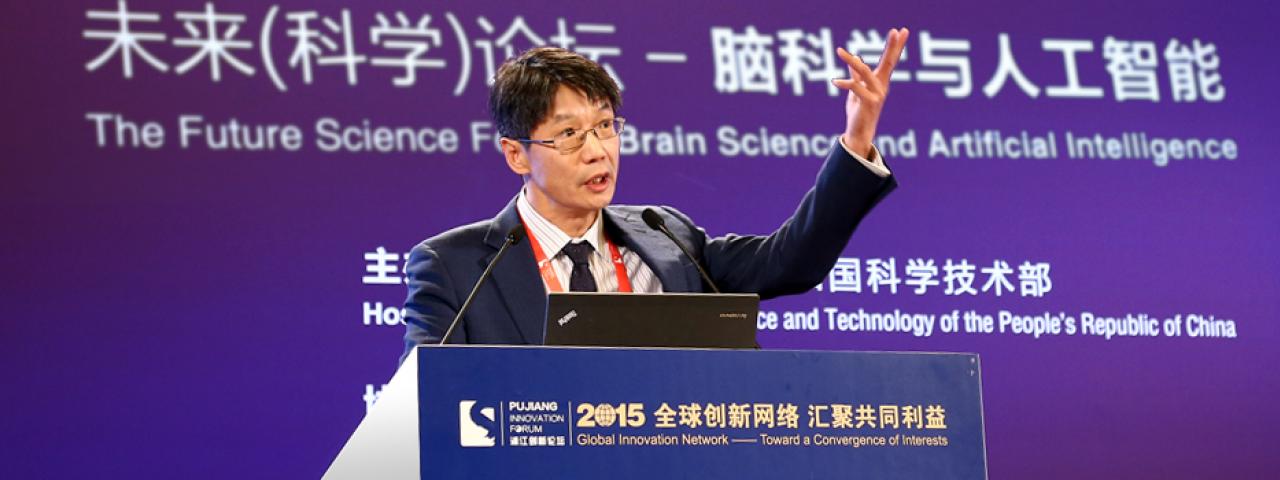Brain Science Needs Its Own Newton

To underscore that science and innovation matters to China and that talent matters to science and innovation, NYU Shanghai Prof. Xiaojing Wang, Associate Vice Chancellor for Research and world renowned theoretical and computational neuroscientist, gave a keynote speech provocatively entitled “Theoretical Neuroscience: Brain Science needs its own Newton”, at the 2015 Pujiang Innovation Forum “The Future Science Forum - Brain science and artificial intelligence”.
In the same way Newton’s laws explain so many aspects of our lives and has predictive power in such modern-day engineering feats as landing on the moon, Prof. Wang called on his colleagues to “develop fundamental theory in the language of mathematics to make sense of big data from laboratory experiments, explain our behavior and mental life, and provide a foundation for brain-inspired artificial intelligence.”
Acknowledging the challenges of brain science and artificial neuroscience, Wang singled out the unique role computational neuroscience can play in bridging these two vast fields. However, he warned that China’s future leadership in this arena requires not only the development of interdisciplinary sciences, such as computational neuroscience, but also stronger links among fields as diverse as neuroscience, cognitive science, and psychology with electrical engineering, computer science, mathematics, and physics. In his remarks to over three hundred outstanding scientists and business leaders, Prof. Xiaojing Wang recommended the establishment of new infrastructure and funding mechanisms to support cross-disciplinary research. Such an initiative, Wang offered, would attract and, most importantly, train young talents from Physics, Engineering, Mathematics and Computer Science, as well as Biology and Psychology.
As one of the most important gathering of its kind in China, the Forum was extremely well attended, bringing together leading scholars, including Sean Hill, the co-Director of the Blue Brain Project and co-Director of Neuroinformatics in the European Union funded Human Brain Project (HBP); Guo Aike, Academician of the Chinese Academy of Sciences; Luo Qingming, Vice President of Huazhong University of Science and Technology; Deng Li, Principal Researcher at Microsoft Research; Wang Jun, Partner of BGI and Founder of Tanyuan Tech; and, Feng Jianfeng, Professor from Fudan University. Xu Ningsheng, Academician of the of Chinese Academy of Sciences and President of Fudan University moderated the Forum held to review progress and explore cutting edge topics of brain research and artificial intelligence.
Professor Wang also introduced his research team’s new findings and highlighted NYU Shanghai’s excellence in scientific research, computational neuroscience in particular. He said, “Pujiang Innovation Forum is putting the spotlight on brain and artificial intelligence, a major area of research development at NYU Shanghai. Shanghai determined to advance this cutting edge science, and we, at NYU Shanghai, are delighted to play a significant part in this collaborative endeavor.”
About Pujiang Innovation Forum
Launched in 2008, the “Pujiang Innovation Forum” is one of the highest-level innovation forums in China, jointly hosted by the Ministry of Science and Technology and the Municipal Government of Shanghai. The Forum serves as a platform for the exchange of innovative ideas and academic thoughts among government, enterprises and academic organizations. It is also a forum for the release of new policies and the promotion of scientific diplomacy. The main theme of this year’s Forum was “Global Innovation Network: Toward a Convergence of Interests” and the Forum also hosted a series of special sessions such as the Policy Forum, the Entrepreneur Forum, and the Future Science Forum etc.



 沪公网安备31011502017015号
沪公网安备31011502017015号